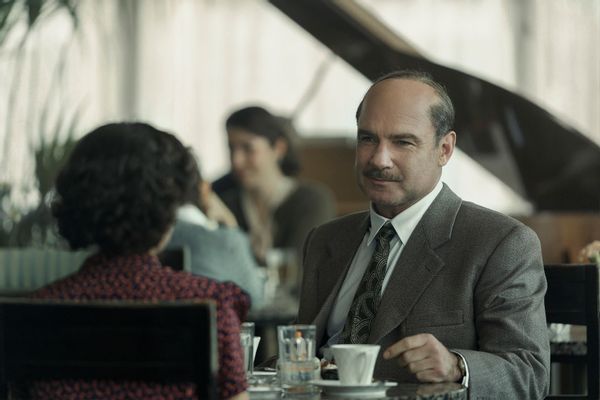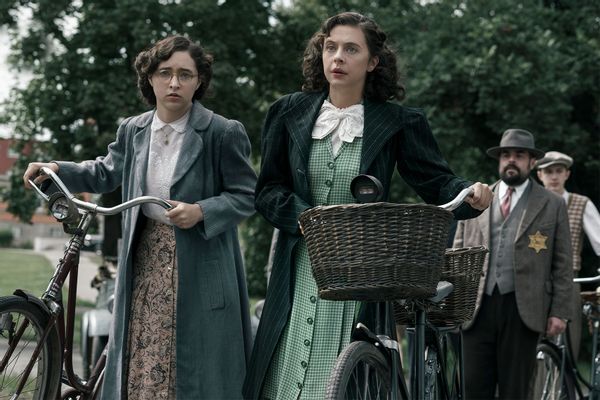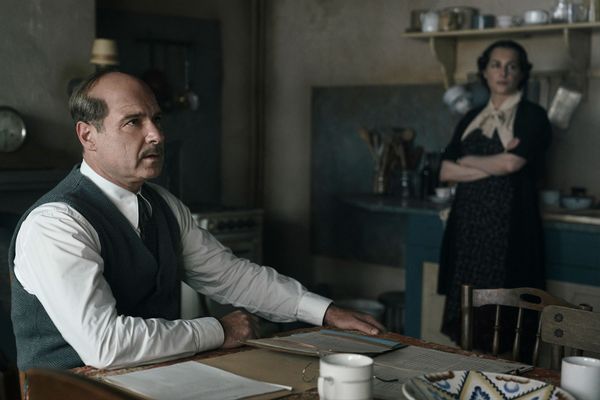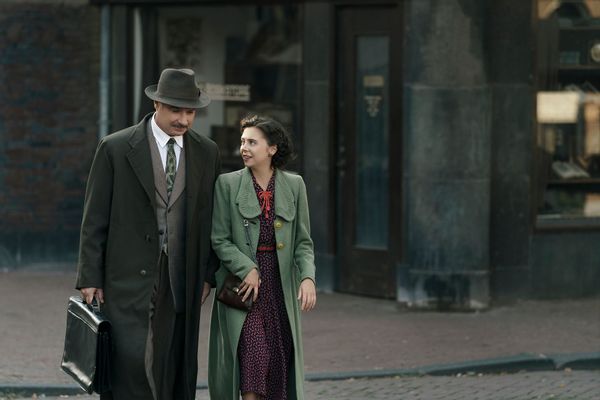
Everything that makes "A Small Light" lively, humorous, harrowing, and relatable hangs off the half-of-a-breath between Otto Frank asking what he admits if too much of his secretary Miep Gies (Bel Powley) and her saying, "Whatever you need."
"What I am asking you to do is dangerous," insists Otto, played by Liev Schreiber, before revealing the nature of his request – he's taking his family into hiding and needs her to provide food and medicine so they can survive. "If you get caught, you could be arrested or even worse."
Otto urges Miep to take time to think about it, insisting she needs to talk it over with her husband Jan (Joe Cole).
"No, I don't. I don't," she insists. "What do I do?"
This exchange occurs midway into the eight-episode limited series' premiere, and by then it's easy to believe Miep's instant commitment to this life-or-death burden. Otto Frank is Miep Gies' boss, a man who gives her a job despite her lack of experience in 1933.
His request comes sometime around 1942, two years into Germany's occupation of the Netherlands and well into a friendship developed over their shared identity as German-speaking immigrants. By then the Nazis were disappearing entire families and shooting shopkeepers in the streets.
Nevertheless, life in Amsterdam continued apace. Dutch people who weren't Jewish lived their lives as their neighbors were rounded up at checkpoints or subjected to horrific public abuses.

"One of the things that stood out about the story for me was that maybe Miep was naive and saying yes to Otto right away like she didn't understand the full impact," Schreiber shared in a recent interview with Salon. "Otto knew that she could be killed for doing it. And I think at that moment, she knew that she could be killed for doing it. But the reality was that for two years, she was going to do this. And it was a lot of work and a lot of stress."
But that response without a second thought is part of what drew Schreiber to take part in "A Small Light," he said. "It's so instant and so human to say yes to each other. That kindness and compassion can be such a big part of our character, and it, I believe, intuitive and natural for us to care about each other."
"A Small Light" illuminates a corner of the story of World War II and the Holocaust that isn't often explored from a facet of a story that is relatively well-known. "The Diary of Anne Frank" remains a defining biographical text of what daily life for a member of a persecuted people living under constant fear of discovery and death; more specifically, it's also the most durable account of what it was like to be a teenage girl in such precarious circumstances.
"Miep was an ordinary woman who stepped into history."
When showrunners and executive producers Joan Rater and Tony Phelan embarked on developing "A Small Light" six years ago, they were compelled by Miep's story – not only as the woman who kept Anne, her sister Margo, mother Edith, and Otto hid in the Secret Annex for two years, but by the fact of who she was.
If Americans have any familiarity with Miep Gies, that's likely due to her presence in numerous documentaries about the Holocaust. They might also recall her silent appearance beside filmmaker Jon Blair in 1996 as he accepted the Academy Award for his documentary "Anne Frank Remembered."

Gies, who died in 2010 at the age of 100, gave dozens of interviews during her lifetime, most of them in Dutch, which Rater and Phelan had to have translated. Gies kept the Franks, along with another family, the van Pels, and family acquaintance, Dr. Fritz Pfeffer, hidden for 25 months beginning in July 1942. She and co-worker found Anne's journals before Nazi soldiers cleared out the Annex and kept them, hoping to return them to Anne when the war was over.
Tragically Anne perished at the Bergen-Belsen concentration camp, leading Gies to give Anne's diaries to Otto, who eventually published them. "The Diary of Anne Frank" provided a young person's view of the war while "A Small Light" allows us to see Anne (Billie Boulet) as a teenager with all of her passion and impatience.
"The Miep Gieses of the world . . . need us to participate."
Similarly, Schreiber explained that this production's access to documents and historical accounts most don't see enabled him to view Otto Frank in more human terms. He didn't want to publish parts of the diaries in which Anne spoke about the tension between him and Edith (played in the series by Amira Casar), for example.
"The other thing that stuck out to me about Otto was that he wasn't a religious person," Schreiber said. "He was very proud of being a German and was someone who took it quite personally that all he was allowed to be was a Jew, because he didn't feel that he necessarily was a Jew. But he was defined by his race. That was something that felt vivid to me."

In this drama's version of Gies' life, in 1933 she was unemployed and on the verge of being forced to marry her adoptive brother, a closeted gay man. This led her to become Otto's secretary and, for a time, the Frank family's savior.
Rater was taken by the fact that Miep did all of this in her 20s, a time of life we consider to be carefree. "I've got a 20-something son who is on the one hand, brilliant, and in the next moment, a complete mess," she pointed out. ". . . You hear about these heroic people, but they really are just normal, average, everyday people who stepped up at a moment they were needed. And Miep was an ordinary woman who stepped into history."
The way Powley plays her, and Rater and Phelan write her, Miep is also irresistibly vivacious and comical.
As Rater and Phelan were developing "A Small Light," democracy around the world plunged into decline, and countries around the world began to embrace authoritarianism in ways that are frighteningly reminiscent of the years leading up to World War II.
This knowledge inspired drama's tone: Rater and Phelan intentionally wove levity through "A Small Light," along with incorporating contemporary banter and other soft anachronisms for the express purpose of making this history relatable. Miep and Jan are flirtatious and romantic in the midst of dire times. She and Otto joke their way through serious moments in ways that other dramas about the Nazi occupation and the Holocaust would never dare to do.

"We had just gone through the pandemic, which was terrifying. And, you know, one of the coping mechanisms we use to get through it is dark humor and laughing. And we imagined that that would be true in all times," Rater explained. "There you are, with your husband, after a day of getting food for the people who have been hiding. And you can't tell anyone. There must be moments of laughing at the absurdity of all of it."
She continued, "People still made jokes. People still had sex. Amsterdam still had beautiful tulips. It was still a hub of cultural activity. All of this was going on, while terrible atrocities were going on. Just like here."
Schreiber admitted to being wary of this approach at first. "I was like, 'Be careful. It's period. We have to be respectful of dialect and period and all these things,'" he said but was eventually won over by the writing's easy relatability.
"I think we all looked at it and went, this is very timely. How do you do it right?" Schreiber asked, then answered, "You luck into actors like Bel Powley and Joe Cole. And then you write their story with this very contemporary, engaging, youthful feel."
For Schreiber, joining "A Small Light" was an extension of the work he's doing with BlueCheck Ukraine, an organization he co-founded that directs funds toward vetted non-governmental and humanitarian aid organizations on the ground in that country. BlueCheck's mission is to ensure donated funds assist those most in need at any given moment.
"I was . . . meeting these people who are ordinary people doing extraordinary things who were trying to help," he explained. "I was meeting these people who are kind of like the heroes that I'm reading about in this script because they're going through it right now. That was why I thought, 'Oh, this is a good thing to do.'"
The "Ray Donovan" star added that he also wanted his children to be reminded of what they're capable of doing, recalling the quote from Gies that inspired the series' title: "Even a regular secretary, a housewife or a teenager can turn on a small light in a dark room," she said.
Schreiber hopes "A Small Light" speaks to viewers at a time when civil rights protections for marginalized people are being rolled back at a furious rate. Miep's simple willingness to say yes, he said, presents an example of what needs to be done when injustice threatens to swallow freedom for everyone.
"There are the lies that the Kremlin media wants the world to believe about why it's there [in Ukraine], that they're ridding Ukraine of Nazism," he said. "Of course that isn't true. Similar lies are happening and authoritarian regimes are popping up all over the world. And you know, people have to say, 'No, it's not true.'"
"We're also so deep into our devices and our groups that we're not really taking the world in," he added. "And for the Miep Gieses of the world who say, 'No, it's worth my life to protect somebody,'" those values and those principles that made this country great -- and that we fought for 80 years ago, and that still make our system the best one in the world, in my opinion -- they need us to participate. They need us to be Mieps. And I love that about this story."
"A Small Light" premieres with two back-to-back episodes 9 p.m. Monday, May 1 on National Geographic, streaming the next day on Disney+ and Hulu.







